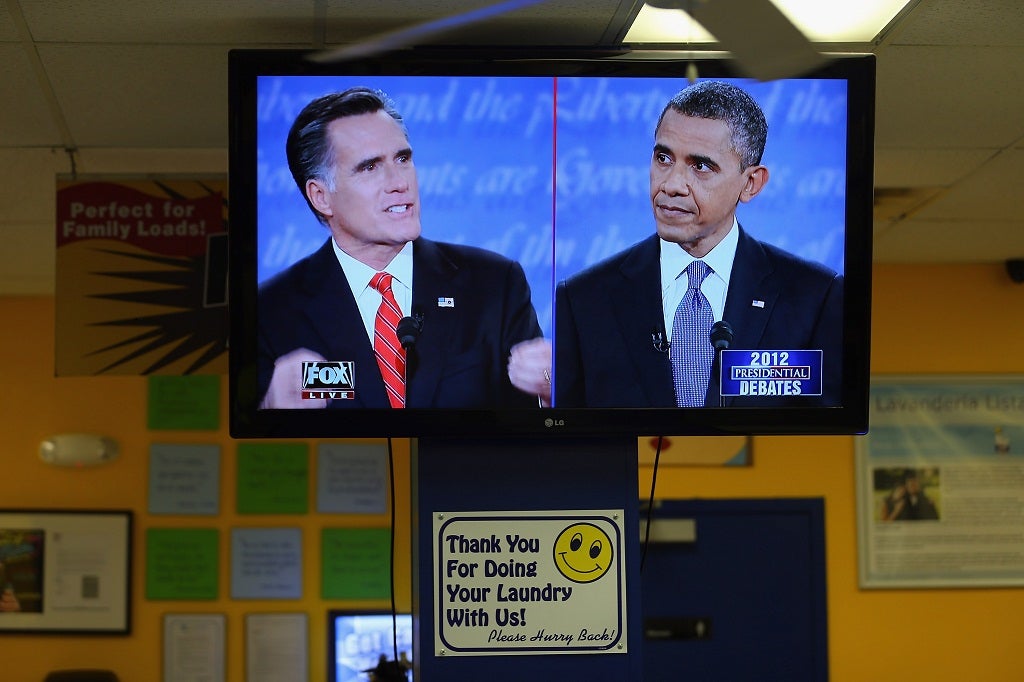The best way to follow Romney and Obama in the presidential debate last night was on Twitter
Our correspondent in America asks what televised debate actually means in the modern media age, and why yesterday fell so far short of theatre

Your support helps us to tell the story
From reproductive rights to climate change to Big Tech, The Independent is on the ground when the story is developing. Whether it's investigating the financials of Elon Musk's pro-Trump PAC or producing our latest documentary, 'The A Word', which shines a light on the American women fighting for reproductive rights, we know how important it is to parse out the facts from the messaging.
At such a critical moment in US history, we need reporters on the ground. Your donation allows us to keep sending journalists to speak to both sides of the story.
The Independent is trusted by Americans across the entire political spectrum. And unlike many other quality news outlets, we choose not to lock Americans out of our reporting and analysis with paywalls. We believe quality journalism should be available to everyone, paid for by those who can afford it.
Your support makes all the difference.With all the goopy economic jargon and high-altitude mathematics in Wednesday night's presidential debate, the typical viewer was left to scrutinize the surface traits of each candidate: his appearance, movement, cadence and tone. By most of those measures, and if you don't deduct points for Mitt Romney's aggravating dismissals of Jim Lehrer's feeble moderation, the Republican candidate was the winner.
But the winner of what? What has this televised tradition become in the era of years-long, spin-cycle campaigning? This was less a lively debate and more a recitation of arithmetical soliloquies that have been performed for months.
For any informed citizen with a balanced-to-gluttonous media diet, this first economy-focused debate at the University of Denver played like a highlight reel of this eternal, infernal campaign: Percentages were repeated, deficits were re-tabulated and "trillions" were tossed around.
The utter wonkiness made for brain-bruising television. So for these 90 minutes, the unwonks of the world had to divine answers from vibe and optics. Former governor Romney was generally fluid and poised in his speech, while President Barack Obama halted and hurdled his way through his sentences, often casting his eyes down during his opponent's time, occasionally breaking into a smug-seeming smile.
Much of America tunes in to see who whiffs or blunders, to take shots of tequila ("Let me be clear"? Drink!), to parse the performances into byte-size visuals or sounds, to pounce on Thursday's meme (which will be Big Bird, to whom Romney paid lip service when talking about cutting PBS funding). We watch to watch our other screens: Our Twitter feeds and their cascades of wryness were more entertaining than the candidates' talk of deductions and exemptions.
Obama (in a partisan blue tie) and Romney (in partisan red) were so scripted that there were few moments of spontaneity or conflict. Primarily fatal to the evening's entertainment quotient was Lehrer's insistence that the studio audience remain silent. This is standard in presidential debates, but it sucks the air out of the room and the viewing experience.
The debate was transmitted mostly in split-screen and staged on what looked like the set of a grade-school civics pageant, with its bright-red carpeting, blue backdrop embossed with constitutional language and looming placard of a bald eagle — never mind that the national mascot also happens to be "a bully, thief, coward [and] eater of carrion," at least according to a 1935 article in Time magazine.
Obama and Romney were all four of those things during the ponderous debate — walking all over Lehrer, stealing their own stump-speech lines, hiding behind big numbers, snacking on anecdotes regarding "real Americans."
There are two sure ways to reinvent the presidential debate as healthy, lively entertainment: Give the moderator the power to cut a candidate's microphone, and get third-party candidates on the stage. Having a third actor who's less beholden to a major-party script would invigorate a campaign tradition that has become as predictable and starchy as the candidates' navy-blue suits and white shirts.
This article first appeared in the Washington Post
Join our commenting forum
Join thought-provoking conversations, follow other Independent readers and see their replies
Comments